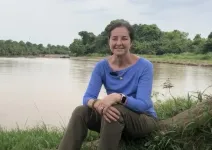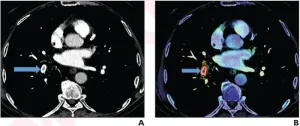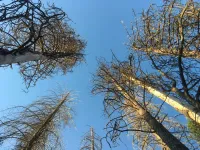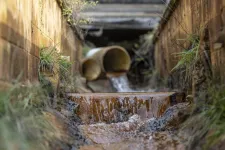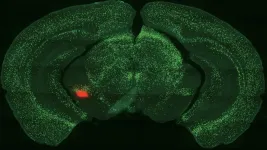(Press-News.org) The Wildlife Conservation Society (WCS) announced today that Monica P. Medina, the first diplomat in the U.S. designated to advocate for global biodiversity, has been named WCS President and CEO, effective June 1, 2023. Medina, current Assistant Secretary of State for Oceans, Environment, and Science; and Special Envoy for Biodiversity and Water Resources will serve until April 30, 2023, at the U.S. Department of State.
Medina ushered in a new era of environmental diplomacy as a foreign policy priority at the State Department. She will join WCS to lead its mission to save wildlife and wild places, harnessing the power of its four zoos, an aquarium, and its Global programs across nearly 60 countries.
Said Chair of the WCS Board of Trustees Alejandro Santo Domingo: “Monica has a proven track record leading on biodiversity policies throughout her distinguished career during the most consequential times for the future health of the planet. She is an accomplished leader with executive, policy, advocacy, and diplomacy experience, and has a deep knowledge of environmental and conservation issues. She joins an extraordinary team at WCS.
“As the world faces three inter-related existential crises—the collapse of biodiversity, climate change, and the persistent threat of pandemics of zoonotic origin—Monica brings a formidable set of skills to accelerate progress on critical policies and conservation action to benefit nature and people. I want to thank Robb Menzi, who has done an outstanding job as WCS Interim President and CEO, following WCS’s former President and CEO Cristián Samper stepping down last year to join the Bezos Earth Fund. Robb will resume his role as Executive Vice President and Chief Operating Officer. WCS has never been stronger.”
Said Medina: “The Wildlife Conservation Society is the perfect organization to carry out my life-long passion to advocate for the protection of nature across the globe. I am optimistic about the world’s future, but we have no time to waste. The team at WCS—in its zoos and aquarium, in policy rooms across the world, and on the ground in multiple continents—is making a great impact in these most challenging times for our planet. WCS Global is leading some of the most innovative and effective conservation programs with governments and Indigenous Peoples and local communities. Underpinned by strong science, WCS influences policies at the local, regional and global level. WCS’s Bronx Zoo, New York Aquarium, Central Park Zoo, Prospect Park Zoo and Queens Zoo in New York City are gateways to educate millions of guests each year, inspiring action for the protection of biodiversity. As a longtime advocate for empowering women in multiple roles in government, I am thrilled to be the first woman to serve as WCS’s President and CEO and to lead this incredible organization in its next chapter.”
In her recent positions at the U.S. Department of State, Medina helped to achieve global agreements to tackle such crises as biodiversity loss; the degradation of the world’s oceans; and plastic pollution. She was pivotal to the Biden Administration’s adoption of the 30x30 goal—the protection of at least 30 percent of the planet’s land and oceans by 2030—and she helped to ensure the same goal was a part of the Kunming-Montreal Global Biodiversity Framework. Further, Medina was a leading negotiator for the U.S. last month behind the adoption of the historic United Nations agreement to protect marine biodiversity in international waters. In earlier years while serving as the National Oceanic and Atmospheric Administration’s (NOAA) Principal Deputy Under Secretary of Commerce, she led efforts on Arctic conservation; restoration of the Gulf of Mexico after the Deepwater Horizon oil spill; conservation of endangered species; and fisheries management and enforcement.
Medina has a long and accomplished career in conservation and environmental policy. She was confirmed as Assistant Secretary for Oceans and International Environmental and Scientific Affairs on September 28, 2021, with bipartisan support in the U.S. Senate. Previously, Medina was an adjunct professor at Georgetown University’s School of Foreign Service. She was also a Senior Associate on the Stephenson Ocean Security Project at the Center for Strategic and International Studies, and Co-Founder and Publisher of Our Daily Planet, an e-newsletter on conservation and the environment. A former Principal Deputy Under Secretary of Commerce for Oceans and Atmosphere, she served as General Counsel of the National Oceanic and Atmospheric Administration (NOAA), and Special Assistant to the Secretary of Defense. Earlier in her career, Medina served as the Senior Counsel to former Senator Max Baucus on the Senate Environment and Public Works Committee; as the Senior Director for Ocean Policy at the National Geographic Society; as the ocean lead at the Walton Family Foundation; and in senior roles in other environmental organizations.
Medina attended college on an Army R.O.T.C. scholarship and began her career on active duty in the Army General Counsel’s Office. She received the Department of Defense Medal for Distinguished Public Service and the Army Meritorious Service Medal. She has a Bachelor’s degree from Georgetown University and a J.D. from Columbia Law School.
Wildlife Conservation Society (WCS)
MISSION: WCS saves wildlife and wild places worldwide through science, conservation action, education, and inspiring people to value nature. To achieve our mission, WCS, based at the Bronx Zoo, harnesses the power of its Global Conservation Program in nearly 60 nations and in all the world’s oceans and its five wildlife parks in New York City, visited by 4 million people annually. WCS combines its expertise in the field, zoos, and aquarium to achieve its conservation mission. Visit: newsroom.wcs.org. Follow: @WCSNewsroom. For more information: +1 (347) 840-1242. Listen to the WCS Wild Audio podcast HERE.
###
END
WCS names new President and CEO - Monica P. Medina
Medina currently serving at the US Dept. of State: Assistant Secretary of State for Oceans, Environment, and Science; and Special Envoy for Biodiversity and Water Resources
2023-04-05
ELSE PRESS RELEASES FROM THIS DATE:
IU researchers receive $8.6M NIH grant renewal to study alcohol use, binge drinking
2023-04-05
INDIANAPOLIS--A multi-disciplinary team of Indiana University researchers is focusing their efforts on a growing public health concern: binge and “high-intensity” drinking—extreme drinking behaviors that are increasingly prevalent among college-age adults.
The researchers, who are part of the Indiana Alcohol Research Center, recently received a five-year, $8.65 million grant renewal from the National Institute on Alcohol Abuse and Alcoholism to support this work.
Established in 1987, the Indiana Alcohol Research Center (IARC) is housed at IU School of Medicine and led by director David Kareken, PhD, a professor of ...
Looking beyond the horizon
2023-04-05
Texas Tech’s Thomas Maccarone has received a grant from the U.S. Air Force Office of Scientific Research to study possible impacts of one layer of the earth’s ionosphere upon radio communications.
Maccarone, a professor in the Department of Physics and Astronomy, said the project will have short- and long-term benefits and implications. The one-year grant is for just more than $500,000.
“We will use a set of dipole radio antennas to study what is called the sporadic E-layer of the ionosphere,” he said. “That is the short-term component the Air Force ...
AI cuts CT turnaround, wait times for positive pulmonary embolus
2023-04-05
Leesburg, VA, April 5, 2023—According to an accepted manuscript published in ARRS’ own American Journal of Roentgenology (AJR), a worklist reprioritization tool with artificial intelligence reduced both report turnaround time and wait time for pulmonary embolus-positive CT pulmonary angiography examinations.
“By assisting radiologists in providing rapid diagnoses, the artificial intelligence (AI) tool could potentially enable earlier interventions for acute pulmonary embolus (PE),” concluded lead researcher Kiran Batra, MD, from the department of radiology at University of Texas Southwestern Medical ...
Gone for good? California’s beetle-killed, carbon-storing pine forests may not come back
2023-04-05
LOS ALAMOS, N.M., April 4, 2023—Ponderosa pine forests in the Sierra Nevada that were wiped out by western pine beetles during the 2012-2015 megadrought won’t recover to pre-drought densities, reducing an important storehouse for atmospheric carbon.
“Forests store huge amounts of atmospheric carbon, so when western pine beetle infestations kill off millions of trees, that carbon dioxide goes back into the atmosphere,“ said Zachary Robbins, a postdoctoral at Los Alamos National Laboratory.
Robbins is corresponding author of a new paper published in the journal Frontiers in Environmental Science about carbon stored in living ponderosa pines in the ...
Dual quasars blaze bright at the center of merging galaxies
2023-04-05
Galaxies grow and evolve by merging with other galaxies, blending their billions of stars, triggering bursts of vigorous star formation, and often fueling their central supermassive black holes to produce luminous quasars that outshine the entire galaxy. Some of these mergers eventually go on to become massive elliptical galaxies that contain black holes that are many billions of times the mass of our Sun. Although astronomers have observed a veritable menagerie of merging galaxies with more than one quasar in our own cosmic neighborhood, more distant examples, seen when the Universe was only a quarter of its current age, are quite rare and ...
SFU research aids fight against treatment-resistant superbugs
2023-04-05
Researchers at Simon Fraser University are studying the genes of superbugs to aid the development of new and effective treatments for drug-resistant bacterial infections. Superbugs are characterized as infection-causing bacteria resistant to treatment with antibiotics.
“Antimicrobial resistance occurs when the disease-causing bacteria has ways to overcome the antibiotics that we use in treatment for infections,” says assistant professor Amy Lee, of SFU's Department of Molecular Biology and Biochemistry. The initiative is a collaboration between the Lee Lab and Brinkman Lab, which are working together as ...
Underground water could be the solution to green heating and cooling
2023-04-05
About 12% of the total global energy demand comes from heating and cooling homes and businesses. A new study suggests that using underground water to maintain comfortable temperatures could reduce consumption of natural gas and electricity in this sector by 40% in the U.S. The approach, called aquifer thermal energy storage (ATES), could also help prevent blackouts caused by high power demand during extreme weather events.
“We need storage to absorb the fluctuating energy from solar and wind, and most people are interested in batteries ...
WVU researchers earn $8M for rare earth extraction facility, an economic and environmental game changer
2023-04-05
West Virginia University researchers will continue to develop and advance their pioneering method to extract and separate rare earth elements and critical minerals from acid mine drainage and coal waste, courtesy of $8 million in new funding from the U.S. Department of Energy.
The grant, part of President Joe Biden’s Investing in America agenda, will lead to the design, construction and operation of a pre-commercial demonstration facility for separating and refining rare earth elements and critical minerals, according to Paul Ziemkiewicz, project lead and director of the West Virginia Water ...
Danger or pleasure? How we learn to tell the difference
2023-04-05
Deep within our brain’s temporal lobes, two almond-shaped cell masses help keep us alive. This tiny region, called the amygdala, assists with a variety of brain activities. It helps us learn and remember. It triggers our fight-or-flight response. It even promotes the release of a feel-good chemical called dopamine. Scientists have learned all this by studying the amygdala over hundreds of years. But we still haven’t reached a full understanding of how these processes work.
Now, Cold Spring Harbor Laboratory neuroscientist Bo Li has brought us several important steps closer. His lab recently made a series of discoveries ...
Ice sheets can collapse faster than previously thought possible
2023-04-05
Ice sheets can retreat up to 600 metres a day during periods of climate warming, 20 times faster than the highest rate of retreat previously measured.
An international team of researchers, led by Dr Christine Batchelor of Newcastle University, UK, used high-resolution imagery of the seafloor to reveal just how quickly a former ice sheet that extended from Norway retreated at the end of the last Ice Age, about 20,000 years ago.
The team, which also included researchers from the universities of Cambridge and Loughborough in the UK and the Geological Survey of Norway, mapped more than 7,600 small-scale landforms called ‘corrugation ridges’ across the seafloor. The ridges ...
LAST 30 PRESS RELEASES:
Novel structural insights into Phytophthora effectors challenge long-held assumptions in plant pathology
Q&A: Researchers discuss potential solutions for the feedback loop affecting scientific publishing
A new ecological model highlights how fluctuating environments push microbes to work together
Chapman University researcher warns of structural risks at Grand Renaissance Dam putting property and lives in danger
Courtship is complicated, even in fruit flies
Columbia announces ARPA-H contract to advance science of healthy aging
New NYUAD study reveals hidden stress facing coral reef fish in the Arabian Gulf
36 months later: Distance learning in the wake of COVID-19
Blaming beavers for flood damage is bad policy and bad science, Concordia research shows
The new ‘forever’ contaminant? SFU study raises alarm on marine fiberglass pollution
Shorter early-life telomere length as a predictor of survival
Why do female caribou have antlers?
How studying yeast in the gut could lead to new, better drugs
Chemists thought phosphorus had shown all its cards. It surprised them with a new move
A feedback loop of rising submissions and overburdened peer reviewers threatens the peer review system of the scientific literature
Rediscovered music may never sound the same twice, according to new Surrey study
Ochsner Baton Rouge expands specialty physicians and providers at area clinics and O’Neal hospital
New strategies aim at HIV’s last strongholds
Ambitious climate policy ensures reduction of CO2 emissions
Frontiers in Science Deep Dive webinar series: How bacteria can reclaim lost energy, nutrients, and clean water from wastewater
UMaine researcher develops model to protect freshwater fish worldwide from extinction
Illinois and UChicago physicists develop a new method to measure the expansion rate of the universe
Pathway to residency program helps kids and the pediatrician shortage
How the color of a theater affects sound perception
Ensuring smartphones have not been tampered with
Overdiagnosis of papillary thyroid cancer
Association of dual eligibility and medicare type with quality of postacute care after stroke
Shine a light, build a crystal
AI-powered platform accelerates discovery of new mRNA delivery materials
Quantum effect could power the next generation of battery-free devices
[Press-News.org] WCS names new President and CEO - Monica P. MedinaMedina currently serving at the US Dept. of State: Assistant Secretary of State for Oceans, Environment, and Science; and Special Envoy for Biodiversity and Water Resources
